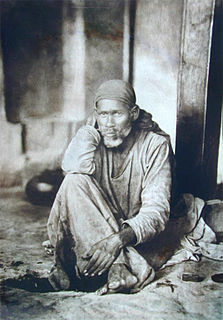A Quote by Dallas Willard
The Spiritual disciplines are wisdom and not righteousness.
Quote Topics
Related Quotes
Christians often equate holiness with activism and spiritual disciplines. And while it's true that activism is often the outgrowth of holiness and spiritual disciplines are necessary for the cultivation of holiness, the pattern of piety in the Scripture is more explicitly about our character. We put off sin and put on righteousness. We put to death the deeds of the flesh and put on Christ. To use the older language, we pursue mortification of the old man and the vivification of the new.
A farmer is helpless to grow grain; all he can do is provide the right conditions for the growing of grain. He cultivates the ground, he plants the seed, he waters the plants, and then the natural forces of the earth take over and up comes the grain...This is the way it is with the Spiritual Disciplines - they are a way of sowing to the Spirit... By themselves the Spiritual Disciplines can do nothing; they can only get us to the place where something can be done.
The Spiritual Disciplines are things that we do. We must never lose sight of this fact. It is one thing to talk piously about 'the solitude of the heart,' but if that does not somehow work its way into our experience, then we have missed the point of the Disciplines. We are dealing with actions, not merely states of mind.
Assess the work of whatever others do to you or say about you, and cultivate fortitude and the understanding to appreciate their behaviour and pardon their faults. This capacity is as invaluable as truth, righteousness, wisdom, non-violence, renunciation, delight and compassion. It is all that one need possess for spiritual advancement.
He that doth righteousness; that is, righteousness which the gospel calleth so, is righteous; that is, precedent to, or before he doth that righteousness. For he doth not say, he shall make his person righteous by acts of righteousness that he shall do; for then an evil tree may bear good fruit, yea, and make itself good by doing so; but he saith, He that doth righteousness is righteous; as he saith, He that doth righteousness is born of him.
Led by myself and two colleagues, the course offers a newly developed model of spiritual direction that draws on both the age-old wisdom of the church and more recent perspectives. I call it the Passion/Wisdom Model of Spiritual Direction, and I see it as offering the opportunity for our interior worlds and supernatural reality to meet.
Yet, after all, faith is not our righteousness. It is accounted to us in order to righteousness (Rom 4:5, GREEK), but not as righteousness; for in that case it would be a work like any other doing of man, and as such would be incompatible with the righteousness of the Son of God; the righteousness which is by faith. Faith connects us with the righteousness, and is therefore totally distinct from it. To confound the one with the other is to subvert the whole gospel of the grace of God. Our act of faith must ever be a separate thing from that which we believe.







































